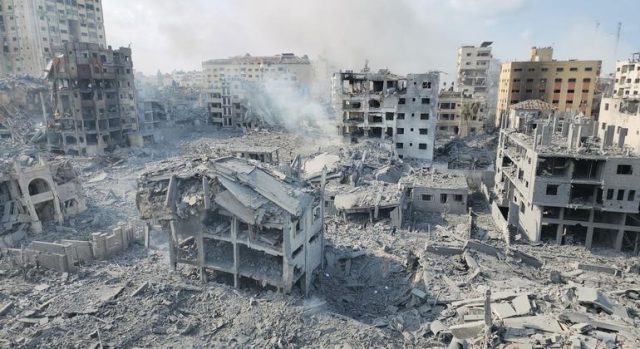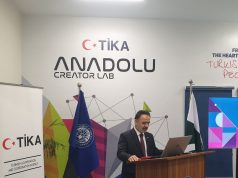UNITED NATIONS, Friday, April 18, 2025 (WNP): Amid relentless Israeli airstrikes across the Gaza Strip that claimed at least 23 lives on Thursday, the head of the United Nations agency for Palestinian refugees (UNRWA) issued a pressing call for international media access to Gaza, where local journalists remain trapped amid escalating violence.
“Palestinian journalists continue to do heroic work, paying a heavy price; 170 have been killed to date,” said Philippe Lazzarini, UNRWA Commissioner-General. “The free flow of information and independent reporting are essential for ensuring accountability and uncovering facts during conflicts,” he emphasized.
Lazzarini warned that reliable reporting had increasingly been overtaken by propaganda and “dehumanizing” narratives since the conflict reignited more than 18 months ago.
Echoing these concerns, Ajith Sunghay, head of the UN Human Rights Office (OHCHR) in the Occupied Palestinian Territory, underscored the peril journalists face. “The environment has always been difficult, but since October 7, 2023, we’ve recorded a significant spike in killings, detentions, and censorship,” he told UN News.
According to OHCHR data, 209 journalists have been killed in Gaza since October 7, including those targeted while on duty or at home. The situation for journalists in the West Bank also remains dire, with reports of arbitrary arrests, physical abuse, and threats of sexual violence against female reporters by Israeli authorities.
“Journalists are civilians and are protected under international humanitarian law unless directly participating in hostilities,” Sunghay said, adding that Palestinian authorities have also been implicated in the oppression of media professionals. “The intentional killing of journalists constitutes a war crime, a point we have repeatedly stressed,” he added.
Meanwhile, humanitarian agencies raised alarms over the deteriorating conditions in Gaza following Israel’s six-week-old blockade, which has cut off the entry of food, fuel, and other vital supplies. Fuel shortages have forced bakeries to close, hospitals to run out of medicines, and generators to fail, according to UNRWA.
Since Israel resumed its bombing campaign on March 18, roughly 500,000 Palestinians have been newly displaced, said UN spokesperson Stephanie Tremblay. This comes amid Israeli Defence Minister’s announcement that troops would remain indefinitely in designated “security zones” within Gaza, Lebanon, and Syria.
Humanitarian operations have also been hampered, with only two of six UN-coordinated aid missions permitted to proceed on Wednesday. A mission to retrieve critically needed fuel from Rafah was among those denied, Tremblay noted, citing the UN Office for the Coordination of Humanitarian Affairs (OCHA).
The Israeli military has reportedly designated approximately 30 percent of Gaza as a security buffer zone where civilian habitation is prohibited.
Despite the mounting obstacles, UNRWA teams continue relief efforts. In southern Gaza’s Maan district, a newly reopened health center—previously damaged in December—has begun providing outpatient services, maternal and child healthcare, vaccinations, and psychosocial support. Blood donation drives are underway to meet critical shortages for emergency operations.
However, UNRWA warned that medicines and medical consumables are running dangerously low.
Meanwhile, repairs have restored a key water well in Jabalia serving approximately 20,000 displaced residents. UNRWA now operates five wells across Gaza, vital for communities struggling amid acute water shortages. According to UNICEF, per capita access to drinking water has plummeted from 16 liters a day to just six.
Solid waste collection continues, albeit at just 40 percent of total needs, highlighting the growing public health crisis.
OCHA’s latest figures reveal a devastating toll: at least 51,000 Palestinians have been killed and over 116,000 injured since October 7, 2023. Since the renewed hostilities began in March, 1,630 more deaths and 4,302 injuries have been recorded.
“The lack of heavy machinery severely hampers rescue efforts for those trapped under rubble,” OCHA reported, citing continued Israeli bombardments targeting even tents housing displaced civilians.
Alarmingly, the humanitarian Nutrition Cluster has warned of a surge in child malnutrition. In March alone, 3,696 children were newly diagnosed with acute malnutrition—a dramatic rise from February’s figures—amid collapsing health services and widespread food insecurity.




